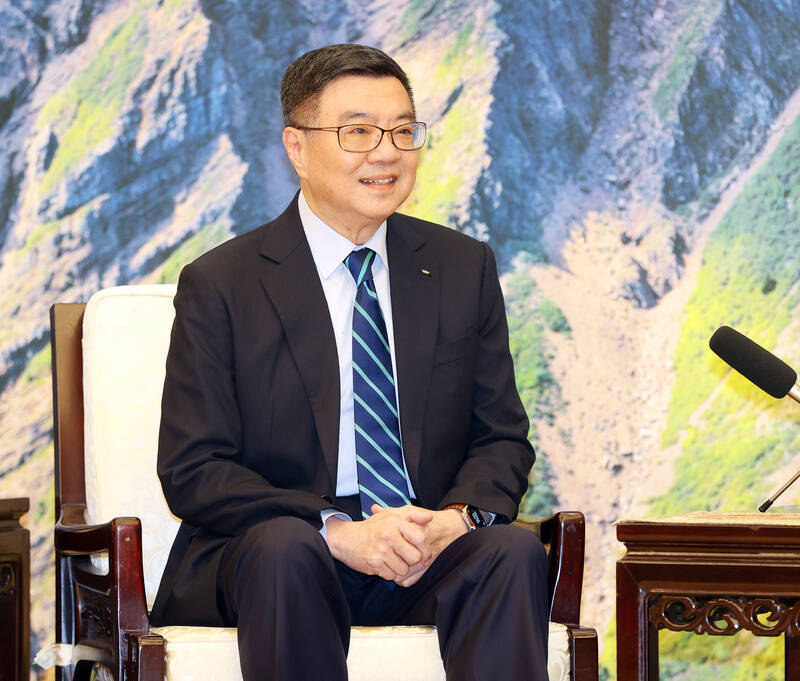Premier-designate Cho Jung-tai (卓榮泰) yesterday announced the latest list of deputy ministers who are to take office after the inauguration of president-elect William Lai (賴清德) on May 20.
The list, a mixture of old and new officials, ensures continuity, with officials who have performed well staying on while new blood is injected into the incoming administration, Cho said, adding that the new Cabinet would advance democracy, peace and prosperity.
Representative to France Francois Wu (吳志中) has been tapped to be a deputy foreign minister, joining incumbent Deputy Minister of Foreign Affairs Tien Chung-kwang (田中光).

Photo: Liu Hsin-de, Taipei Times
As an envoy, Wu is known for his initiative, making high-profile media appearances and bolstering bilateral cooperation with France in business and public health, Cho said.
Deputy ministers of national defense Hsu Yen-pu (徐衍璞) and Po Horng-huei (柏鴻輝) are to continue in their posts. Hsu was a former commander of the army, executive officer to the deputy chief of the general staff and commander of the Sixth Army Corps, while Po was a deputy executive officer of the Institute for National Defense and Security Research and air force chief of staff.
Former Democratic Progressive Party legislator Huang Shih-chieh (黃世杰) and National Security Bureau Deputy Director-General Hsu Hsi-hsiang (徐錫祥) are to be deputy ministers of justice.
Huang was on the Judiciary and Organic Laws and Statutes Committee and Internal Administration Committee during his stint as a lawmaker, while Hsu Hsi-hsiang had served as a prosecutor and head prosecutor at the Taichung District Prosecutors’ Office, head prosecutor at the Kinmen District Prosecutors’ Office and Changhua District Prosecutors’ Office, and head prosecutor at the High Prosecutors’ Office.
Ho Chin-tsang (何晉滄), director-general of the Small and Medium Enterprise Administration, is to be a deputy minister of economic affairs.
Ho will continue his work to sharpen the international competitiveness of Taiwanese small and medium-sized enterprises and advancing the government’s goal to cut carbon emissions, Cho said.
National Development Council Deputy Minister Kao Shien-quey (高仙桂) and Mainland Affairs Council Deputy Minister Liang Wen-chieh (梁文傑) have been retained, as well as Overseas Community Affairs Council Deputy Minister Ruan Jhao-syong (阮昭雄) and Veteran Affairs Council Deputy Minister Fu Cheng-cheng (傅正誠).
Ocean Affairs Council Vice Minister Wu Mei-hung (吳美紅) is to remain in her post, with the other vice ministerial post going to Ocean Conservation Administration Director-General Huang Hsiang-wen (黃向文).
Council of Indigenous Peoples Deputy Minister Qucung Qalavangan is to be joined by Land Administration Department Director Du Chang Mei-chuang (杜張梅莊).
National Palace Museum Director Hsiao Tsung-huang (蕭宗煌) and his deputy, Huang Yung-tai (黃永泰), have also been retained.
Meanwhile, former minister of health and welfare Chen Shih-chung (陳時中), Minister of Culture Shih Che (史哲), Taiwan Council for US Affairs Chairperson Yang Jen-ni (楊珍妮) and National Taiwan University professor of law Lin Ming-Hsin (林明昕) have been tapped to be ministers without portfolio.

SECURITY: As China is ‘reshaping’ Hong Kong’s population, Taiwan must raise the eligibility threshold for applications from Hong Kongers, Chiu Chui-cheng said When Hong Kong and Macau citizens apply for residency in Taiwan, it would be under a new category that includes a “national security observation period,” Mainland Affairs Council (MAC) Minister Chiu Chui-cheng (邱垂正) said yesterday. President William Lai (賴清德) on March 13 announced 17 strategies to counter China’s aggression toward Taiwan, including incorporating national security considerations into the review process for residency applications from Hong Kong and Macau citizens. The situation in Hong Kong is constantly changing, Chiu said to media yesterday on the sidelines of the Taipei Technology Run hosted by the Taipei Neihu Technology Park Development Association. With

‘FORM OF PROTEST’: The German Institute Taipei said it was ‘shocked’ to see Nazi symbolism used in connection with political aims as it condemned the incident Sung Chien-liang (宋建樑), who led efforts to recall Democratic Progressive Party (DPP) Legislator Lee Kun-cheng (李坤城), was released on bail of NT$80,000 yesterday amid an outcry over a Nazi armband he wore to questioning the night before. Sung arrived at the New Taipei City District Prosecutors’ Office for questioning in a recall petition forgery case on Tuesday night wearing a red armband bearing a swastika, carrying a copy of Adolf Hitler’s Mein Kampf and giving a Nazi salute. Sung left the building at 1:15am without the armband and apparently covering the book with a coat. This is a serious international scandal and Chinese

A US Marine Corps regiment equipped with Naval Strike Missiles (NSM) is set to participate in the upcoming Balikatan 25 exercise in the Luzon Strait, marking the system’s first-ever deployment in the Philippines. US and Philippine officials have separately confirmed that the Navy Marine Expeditionary Ship Interdiction System (NMESIS) — the mobile launch platform for the Naval Strike Missile — would take part in the joint exercise. The missiles are being deployed to “a strategic first island chain chokepoint” in the waters between Taiwan proper and the Philippines, US-based Naval News reported. “The Luzon Strait and Bashi Channel represent a critical access

COUNTERINTELLIGENCE TRAINING: The ministry said 87.5 percent of the apprehended Chinese agents were reported by service members they tried to lure into becoming spies Taiwanese organized crime, illegal money lenders, temples and civic groups are complicit in Beijing’s infiltration of the armed forces, the Ministry of National Defense (MND) said in a report yesterday. Retired service members who had been turned to Beijing’s cause mainly relied on those channels to infiltrate the Taiwanese military, according to the report to be submitted to lawmakers ahead of tomorrow’s hearing on Chinese espionage in the military. Chinese intelligence typically used blackmail, Internet-based communications, bribery or debts to loan sharks to leverage active service personnel to do its bidding, it said. China’s main goals are to collect intelligence, and develop a